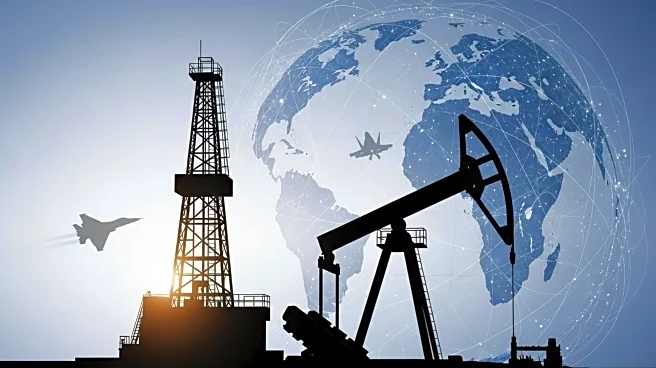What is the story about?
What's Happening?
The EU and U.S. have intensified sanctions on Russia's defense sector, targeting its military-industrial complex and energy revenues. These measures have disrupted Russia's ability to modernize its equipment and forced a strategic realignment in transatlantic economic priorities. The EU's REPowerEU Plan aims to phase out Russian fossil fuels by 2027, supported by a €300 billion funding package. Concurrently, the U.S. has allocated $849.8 billion for defense spending, emphasizing AI and space technologies. Investors are exploring opportunities in sanctions-resistant equities, such as U.S. energy exporters and clean energy ETFs.
Why It's Important?
The sanctions against Russia have significant implications for global markets, particularly in energy and defense sectors. By reducing dependency on Russian energy, the EU is accelerating its transition to clean energy, which could reshape energy consumption patterns. The increased defense spending by the EU and U.S. highlights a shift towards innovation in military technologies, potentially boosting sectors like AI and cybersecurity. Investors face both risks and opportunities, as they navigate geopolitical uncertainties and seek growth in sanctions-resistant equities.
What's Next?
The strategic realignment in energy and defense markets is likely to continue, with investors focusing on sectors resilient to sanctions pressures. The EU's commitment to import American LNG and nuclear fuels presents opportunities for U.S. energy exporters. In defense, firms like Thales and Leonardo are expanding their capabilities, driven by increased demand for innovative technologies. As geopolitical tensions persist, investors may prioritize diversified portfolios to mitigate risks associated with regulatory changes and currency fluctuations.
Beyond the Headlines
The sanctions have ethical and legal dimensions, as they impact Russia's economy and its ability to engage in global trade. The focus on clean energy and advanced defense technologies reflects broader shifts towards sustainability and security. These developments may influence long-term policy decisions and international relations, as countries reassess their strategic priorities in response to evolving geopolitical landscapes.















